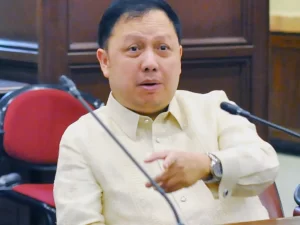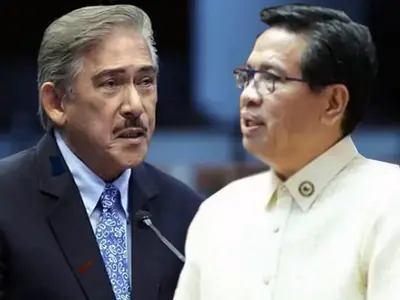
TINGOG Party-list Representatives Jude Acidre and Andrew Romualdez, together with EDCOM 2 Executive Director Karol Mark Yee, filed three landmark education reform bills in the House of Representatives to modernize TESDA, strengthen SUC governance, and set unified standards for LUCs. Photo courtesy of TINGOG Party-list.
TINGOG Party-list Representatives Jude Acidre and Andrew Julian Romualdez on Tuesday filed three landmark measures in the House of Representatives aimed at instituting comprehensive reforms in the governance of the country’s higher and technical-vocational education sector.
The legislative package seeks to modernize the Technical Education and Skills Development Authority (TESDA) by amending Republic Act 7796 of 1994, strengthen the governance of state universities and colleges (SUCs) by amending Republic Act 8292 or the Higher Education Modernization Act of 1997, and establish a unified governance framework for local universities and colleges (LUCs). These bills are designed to create a more coordinated, responsive, and accountable post-secondary education system in the Philippines.
Rep. Jude Acidre, Chairperson of the House Committee on Higher and Technical Education and Co-Chairperson of the Second Congressional Commission on Education (EDCOM 2), said the reforms are about ensuring that schools and training institutions truly serve the hopes of Filipino learners.
“Our young people deserve schools and training centers that can prepare them for the future they dream of. Modernizing TESDA, strengthening governance in SUCs, and setting clear standards for LUCs are steps to make sure our institutions are not just keeping up with change, but helping students get ahead. At the heart of these reforms is a simple promise—that every Filipino learner will have the chance to succeed and build a better life,” Acidre said.
Rep. Andrew Julian Romualdez, Vice-Chairperson of the House Committee on Higher and Technical Education, emphasized that the measures are not only about institutions, but about the students and families who depend on them.
“At its core, education reform is about fostering potential. It’s about recognizing the dreams of our students and their families who look to us for guidance and support. This legislative initiative is intended to fortify our educational framework, ensuring that every student has the opportunity to excel and carve out a future that reflects their ambitions and capabilities,” Romualdez said.
The three bills filed by TINGOG Party-list are: House Bill No. 4798 or the TESDA Modernization Act of 2025, which updates RA 7796 to strengthen TESDA’s authority, devolve certain training functions to LGUs, establish industry boards, and modernize assessment and scholarship systems.
House Bill No. 4799 amending RA 8292 or the Higher Education Modernization Act of 1997, which revises the composition and powers of SUC governing boards, clarifies CHED’s role, introduces differentiated autonomy, and creates a Philippine Higher Education Academy to professionalize leadership.
House Bill No. 4800 or the Local Universities and Colleges Governance Act, which prescribes mandatory guidelines for the establishment and governance of LUCs, strengthens workforce development functions, and grants fiscal autonomy to ensure quality and relevant education. Acidre closed by underscoring the bigger picture: “Ultimately, our goal is to empower these vital institutions to produce graduates who are skilled, knowledgeable, and prepared to contribute meaningfully to national development,” he said.
Romualdez echoed this sentiment: “These reforms represent our covenant with future generations—to transform education from a maze of uncertainties into a clear pathway of possibilities. When we succeed here, we’re not just reforming institutions; we’re giving every Filipino student the tools that can transform not just their lives, but our nation’s future,” he said.



